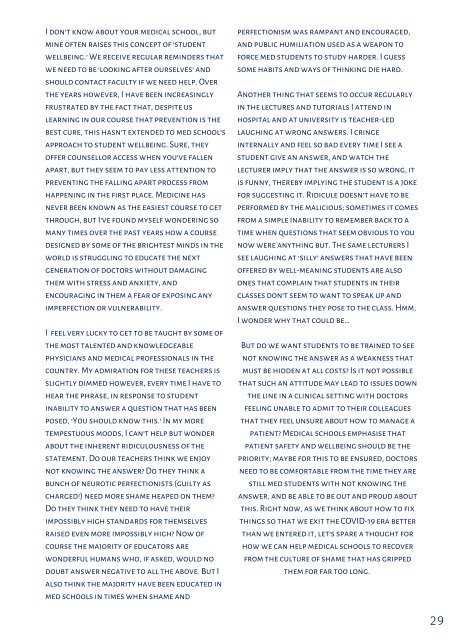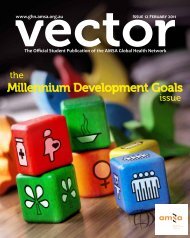PANACEA 2020
panacea /ˌpanəˈsiːə/ noun a solution or remedy for all difficulties or diseases. The term ‘Panacea’ embodies humanity’s unfaltering idealism, our wishful thinking and our unattainable dreams. It is this idealism which lays the foundation for our ambition and perseverance in the face of unparalleled hardship, and which fuels our resilience after defeat. In a time like the present and indeed throughout history, the concept of a ‘Panacea’ has been a frank deviation from reality – it is nothing more than a fantasy or escape. Nonetheless, for us, ‘Panacea’ is a delight, a source of hope and a symbol of our unending optimism. This year, the theme of AMSA’s student magazine, Panacea, is “When the dust settles: Reflection and renewal in a COVID-19 world.” We asked medical students from across Australia to submit written pieces or artwork relevant to the theme, for publication in a colourful and engaging digital magazine. Please enjoy the compilation of these wonderful works in Panacea 2020.
panacea
/ˌpanəˈsiːə/
noun
a solution or remedy for all difficulties or diseases.
The term ‘Panacea’ embodies humanity’s unfaltering idealism, our wishful thinking and our unattainable dreams. It is this idealism which lays the foundation for our ambition and perseverance in the face of unparalleled hardship, and which fuels our resilience after defeat. In a time like the present and indeed throughout history, the concept of a ‘Panacea’ has been a frank deviation from reality – it is nothing more than a fantasy or escape. Nonetheless, for us, ‘Panacea’ is a delight, a source of hope and a symbol of our unending optimism.
This year, the theme of AMSA’s student magazine, Panacea, is “When the dust settles: Reflection and renewal in a COVID-19 world.” We asked medical students from across Australia to submit written pieces or artwork relevant to the theme, for publication in a colourful and engaging digital magazine. Please enjoy the compilation of these wonderful works in Panacea 2020.
You also want an ePaper? Increase the reach of your titles
YUMPU automatically turns print PDFs into web optimized ePapers that Google loves.
I don’t know about your medical school, but<br />
mine often raises this concept of ‘student<br />
wellbeing.’ We receive regular reminders that<br />
we need to be ‘looking after ourselves’ and<br />
should contact faculty if we need help. Over<br />
the years however, I have been increasingly<br />
frustrated by the fact that, despite us<br />
learning in our course that prevention is the<br />
best cure, this hasn’t extended to med school’s<br />
approach to student wellbeing. Sure, they<br />
offer counsellor access when you’ve fallen<br />
apart, but they seem to pay less attention to<br />
preventing the falling apart process from<br />
happening in the first place. Medicine has<br />
never been known as the easiest course to get<br />
through, but I’ve found myself wondering so<br />
many times over the past years how a course<br />
designed by some of the brightest minds in the<br />
world is struggling to educate the next<br />
generation of doctors without damaging<br />
them with stress and anxiety, and<br />
encouraging in them a fear of exposing any<br />
imperfection or vulnerability.<br />
I feel very lucky to get to be taught by some of<br />
the most talented and knowledgeable<br />
physicians and medical professionals in the<br />
country. My admiration for these teachers is<br />
slightly dimmed however, every time I have to<br />
hear the phrase, in response to student<br />
inability to answer a question that has been<br />
posed, ‘You should know this.’ In my more<br />
tempestuous moods, I can’t help but wonder<br />
about the inherent ridiculousness of the<br />
statement. Do our teachers think we enjoy<br />
not knowing the answer? Do they think a<br />
bunch of neurotic perfectionists (guilty as<br />
charged!) need more shame heaped on them?<br />
Do they think they need to have their<br />
impossibly high standards for themselves<br />
raised even more impossibly high? Now of<br />
course the majority of educators are<br />
wonderful humans who, if asked, would no<br />
doubt answer negative to all the above. But I<br />
also think the majority have been educated in<br />
med schools in times when shame and<br />
perfectionism was rampant and encouraged,<br />
and public humiliation used as a weapon to<br />
force med students to study harder. I guess<br />
some habits and ways of thinking die hard.<br />
Another thing that seems to occur regularly<br />
in the lectures and tutorials I attend in<br />
hospital and at university is teacher-led<br />
laughing at wrong answers. I cringe<br />
internally and feel so bad every time I see a<br />
student give an answer, and watch the<br />
lecturer imply that the answer is so wrong, it<br />
is funny, thereby implying the student is a joke<br />
for suggesting it. Ridicule doesn’t have to be<br />
performed by the malicious; sometimes it comes<br />
from a simple inability to remember back to a<br />
time when questions that seem obvious to you<br />
now were anything but. The same lecturers I<br />
see laughing at ‘silly’ answers that have been<br />
offered by well-meaning students are also<br />
ones that complain that students in their<br />
classes don’t seem to want to speak up and<br />
answer questions they pose to the class. Hmm,<br />
I wonder why that could be…<br />
But do we want students to be trained to see<br />
not knowing the answer as a weakness that<br />
must be hidden at all costs? Is it not possible<br />
that such an attitude may lead to issues down<br />
the line in a clinical setting with doctors<br />
feeling unable to admit to their colleagues<br />
that they feel unsure about how to manage a<br />
patient? Medical schools emphasise that<br />
patient safety and wellbeing should be the<br />
priority; maybe for this to be ensured, doctors<br />
need to be comfortable from the time they are<br />
still med students with not knowing the<br />
answer, and be able to be out and proud about<br />
this. Right now, as we think about how to fix<br />
things so that we exit the COVID-19 era better<br />
than we entered it, let’s spare a thought for<br />
how we can help medical schools to recover<br />
from the culture of shame that has gripped<br />
them for far too long.<br />
29

















